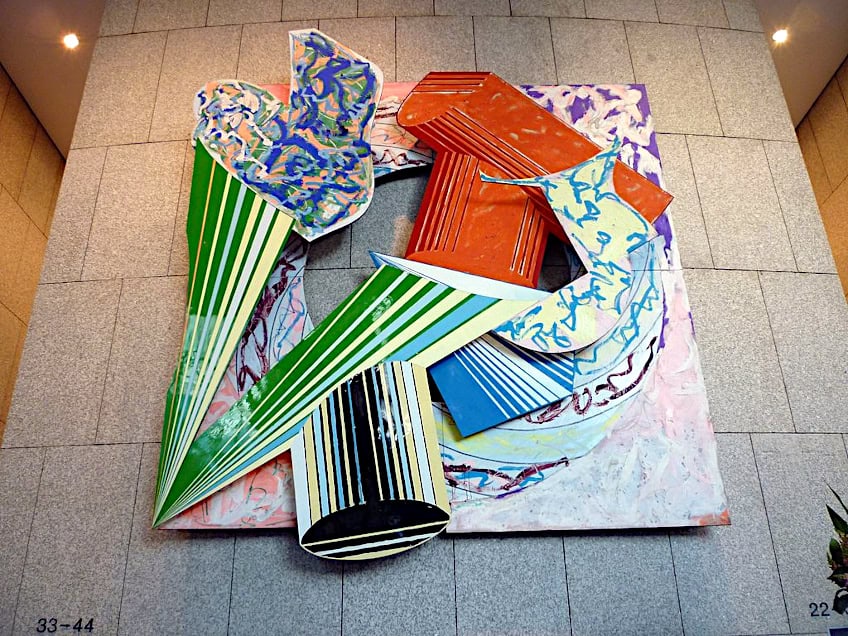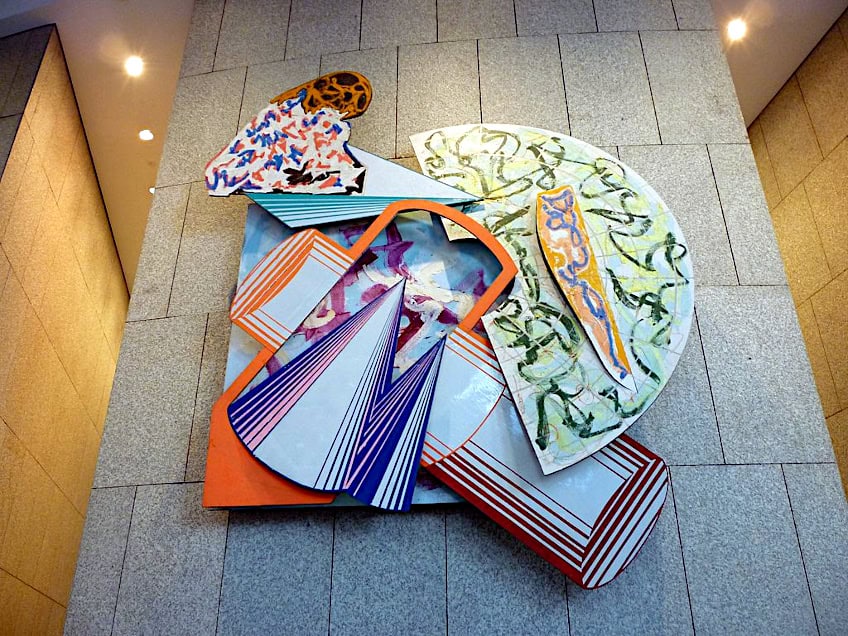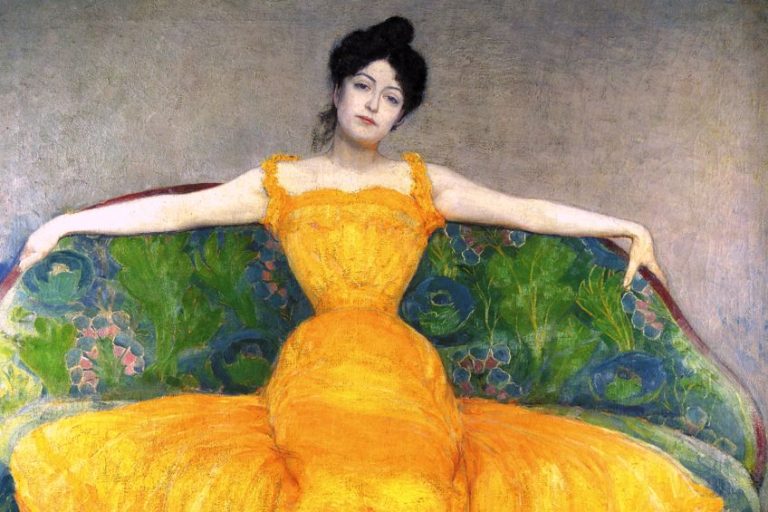Frank Stella Dies at 87 – A Legacy of Innovation
Frank Stella, an iconic figure in contemporary art, has passed away at the age of 87, leaving behind a profound legacy that reshaped the landscape of abstract art. Known for his innovative approach to geometric abstraction and vibrant use of color, Stella’s work challenged traditional notions of painting and pushed boundaries within the art world. Throughout his illustrious career, he explored various styles and techniques, from his early minimalist Black Paintings to later monumental sculptures and mixed-media pieces. Stella’s contributions to the art world continue to inspire generations of artists and admirers, marking him as a visionary whose impact will endure far many years to come.
Key Takeaways
- Frank Stella’s transformational work signaled the end of Abstract Expressionism.
- Stella’s diverse portfolio in painting, sculpture, and printmaking contributed to his renowned status.
- His passing marks a significant loss for the contemporary art world.
Life and Legacy of Frank Stella
| Birth | May 12, 1936 |
| Death | May 4, 2024 |
| Place of Birth | Malden, Massachusetts, United States |
| Place of Death | New York City, New York, United States |
| Cause of Death | Lymphoma |
Frank Stella, a monumental figure in the world of contemporary art, has passed away at the age of 87. Known for his pivotal role in the development of minimalism, Stella’s innovative Black Paintings marked the end of Abstract Expressionism and initiated a new era characterized by stark, reductive aesthetics. Throughout his career, his work saw constant transformation, exploring the boundaries between painting and sculpture, and gaining widespread recognition for his geometric abstraction.

As a harbinger of Minimalism, Stella’s influence extended beyond the canvas. His work spanned painting, sculpture, and printmaking, demonstrating his versatility and refusal to be confined by traditional artistic labels. He continued to create and exhibit new works well into his 80s, showcasing not only a commitment to the evolution of his own artistry but also the enduring vitality of his creative vision.
Stella’s death signals the loss of a pioneering spirit whose impact on the art world will be felt for generations to come.
Early Years in Malden, Massachusetts
Born on May 12, 1936, in Malden, Massachusetts, Stella was the son of Frank and Constance (Santonelli) Stella. His mother’s background in art, as she later took up landscape painting, may have played a role in nurturing his early interest in the artistic field. Malden provided the backdrop for Stella’s childhood, where the seeds of his artistic inclinations were sown.

Academic Path at Princeton University
At Princeton University, Stella majored in history but also studied painting and developed an interest in the works of Abstract Expressionist artists. His time at Princeton established an academic foundation that later contributed to his intellectual approach to art.
The university’s liberal arts education infused his work with a breadth of references and conceptual depth.
Rise in the New York Art Scene
Stella moved to Manhattan, New York, after his education, where he immersed himself in the vibrant art scene. It was here that he became known for his minimalist paintings characterized by their geometric patterns and stark contrasts. His works played a significant role in shaping post-painterly abstraction and positioned him as a leading figure among American artists. Stella continued to work and evolve his artistic style in Manhattan until his passing at 87, leaving behind a rich legacy that continues to influence and inspire.

Artistic Innovations and Style
Frank Stella’s artistry is characterized by groundbreaking methods and distinct styles, with his journey spanning numerous phases that had profound impacts on contemporary art. His innovations were marked by a bold redefinition of painting’s nature and a relentless pursuit of new forms and spatial dynamics.
The Black Paintings Revolution
The Black Paintings were pivotal to Stella’s early recognition, as they signified a break from more expressive art forms of the time. Flat, gridlike bands of black paint outlined by narrow strips of unpainted canvas demonstrated his minimalist approach—even as they rejected the gestural brushwork of the abstract expressionists. He fostered a pared-down, striking visual language that was both literal and impactful.

Minimalism and Geometric Abstraction
Stella’s contributions to minimalism vividly reflected through his adherence to geometric abstraction. The Protractor series exemplified this, employing curved lines and bright colors to establish a vivid, rhythmic composition.
The use of the protractor instrument allowed Stella to infuse his paintings with a sense of mathematical precision, with each work being a harmonious balance between geometry and color.
Exploration of Space and Form
Stella’s later works ventured beyond the canvas into a realm where painting intersected with sculpture. His large-scale works incorporated metal, mixed media, and polychromatic bands, creating a new pictorial space with their three-dimensionality. The shaped canvas became a hallmark of his style, pushing the boundaries of traditional flat paintings toward sculptural forms that engaged viewers with their dynamic structures and exploration of space and form.

Major Works and Exhibitions
Frank Stella left behind a legacy through his innovative works and celebrated exhibitions. His career spanned over six decades and saw the evolution of his style from minimalism to maximalism, influencing various art movements.
Pinnacle Pieces and Series
Frank Stella became known for his geometric works, beginning with the Black Paintings series which debuted in Sixteen Americans at the Museum of Modern Art (MoMA) in New York. Stella’s use of metals and other industrial materials in his art was pioneering. The Protractor series, which furthered his exploration into color and form, remains a hallmark of his expansive body of work.

In the late 1990s and into the 2000s, Stella began creating large, massive sculptural pieces, pushing the boundaries between visual art and architecture. These later works were noted for their complex engineering and grand scale, many times displayed in monumental exhibitions around the world.
Retrospectives at Leading Museums
One of the most comprehensive reviews of Stella’s work was a retrospective at the Whitney Museum of American Art in New York City, which later traveled internationally. This major exhibition showcased the evolution of Stella’s artwork and its impact on contemporary art.
The Metropolitan Museum of Art (Met) and MoMA have consistently included Stella’s works in their exhibitions, acknowledging his contributions to the modern and contemporary art scene.
Stella’s relationships with influential galleries, including the Leo Castelli Gallery, Marianne Boesky Gallery, and Jeffrey Deitch Gallery, were instrumental in these retrospectives. Notably, gallery owner Jeffrey Deitch commented on Stella’s significance in numerous Associated Press interviews, while the New York Times featured extensive coverage of his exhibitions, solidifying Stella’s standing as an art luminary.
Passing and Impact on the Art World
Stella passed away at 87, leaving a significant legacy that transformed the art world with his innovative approaches. Stella’s death marks the end of an era but his influence continues to resonate among artists and art lovers alike.

Circumstances of Stella’s Death
Frank Stella died due to complications from lymphoma on the 4th of May 2024. His death was confirmed by his wife, Harriet McGurk, and reported by esteemed sources including the New York Times and the Associated Press.
Tributes and Remembrance
Following the news of Stella’s death, tributes poured in from across the globe. Art historians, contemporary artists such as Patrick Morgan, and representatives of institutions recognized Stella for his revolutionary work which often featured massive, colorful sculptures that would twist and coil, redefining spatial perceptions.

Continuation of Stella’s Artistic Influence
The abstract art scene continues to feel Stella’s impact, with artists like Santiago Calatrava citing his innovative spirit. The interplay of vibrant colors and dynamic form that characterized his work remains a touchstone for emerging art movements.
The Legacy Left by Frank Stella
Stella’s legacy is as dynamic as his artworks. Having been part of a circle that included Robert Rauschenberg and Jackson Pollock, he carved a unique path. His career is a testament to the power of abstract art and its capacity to evoke emotion and provoke intellectual discourse, ensuring that his influence will persist in the art world for years to come.

Frank Stella’s passing at the age of 87 marks the end of an era in the art world, yet his influence and contributions will resonate for years to come. His fearless experimentation with form, color, and materials challenged the very essence of art, sparking conversations and paving new paths for generations of artists. Stella’s legacy extends beyond his artworks; it embodies a spirit of innovation, creativity, and relentless pursuit of pushing boundaries. As we reflect on his remarkable journey, we are reminded of the enduring power of art to inspire, provoke, and transcend, ensuring that Frank Stella’s impact remains indelible in the fabric of art history.
Frequently Asked Questions
What Is Frank Stella Renowned for in the Art World?
Frank Stella is renowned for his abstract works, particularly his contribution to the geometric abstraction and minimalism movements. His innovative approach to painting and sculpture has left a lasting impact on contemporary art.
How Has Frank Stella Influenced Modern Art?
Stella has influenced modern art by challenging traditional concepts of painting. His work expanded the boundaries of the medium, incorporating new materials and techniques, which encouraged subsequent generations of artists to explore beyond conventional canvas work.
What Are Notable Masterpieces by Frank Stella?
Notable masterpieces by Frank Stella include his Black Paintings series, which were pivotal in the development of Minimalism, and Sharpeville, among others. His works are characterized by their bold use of color, shape, and form.
Isabella studied at the University of Cape Town in South Africa and graduated with a Bachelor of Arts majoring in English Literature & Language and Psychology. Throughout her undergraduate years, she took Art History as an additional subject and absolutely loved it. Building on from her art history knowledge that began in high school, art has always been a particular area of fascination for her. From learning about artworks previously unknown to her, or sharpening her existing understanding of specific works, the ability to continue learning within this interesting sphere excites her greatly.
Her focal points of interest in art history encompass profiling specific artists and art movements, as it is these areas where she is able to really dig deep into the rich narrative of the art world. Additionally, she particularly enjoys exploring the different artistic styles of the 20th century, as well as the important impact that female artists have had on the development of art history.
Learn more about Isabella Meyer and the Art in Context Team.
Cite this Article
Isabella, Meyer, “Frank Stella Dies at 87 – A Legacy of Innovation.” Art in Context. May 15, 2024. URL: https://artincontext.org/frank-stella-dies-at-87/
Meyer, I. (2024, 15 May). Frank Stella Dies at 87 – A Legacy of Innovation. Art in Context. https://artincontext.org/frank-stella-dies-at-87/
Meyer, Isabella. “Frank Stella Dies at 87 – A Legacy of Innovation.” Art in Context, May 15, 2024. https://artincontext.org/frank-stella-dies-at-87/.











